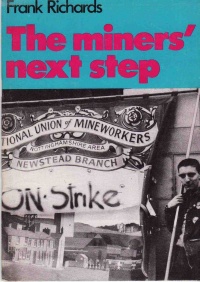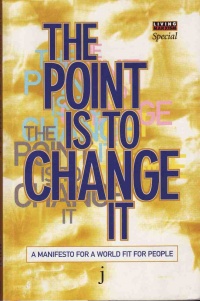Difference between revisions of "Revolutionary Communist Party"
m (→Activities: tense change) |
m (→1996 - Dissolution: caps) |
||
| Line 46: | Line 46: | ||
The RCP was dissolved in 1996, though this seems not to have been announced at the time. In an email written in December 1997 leading RCP member [[James Heartfield]] gave the following account of the demise of the party: | The RCP was dissolved in 1996, though this seems not to have been announced at the time. In an email written in December 1997 leading RCP member [[James Heartfield]] gave the following account of the demise of the party: | ||
| − | :The RCP was disbanded over a fairly long period. The last time we stood in an election was 1992. The last public campaign we were involved in was the [[Campaign Against Militarism]] (which again was set up in 1992, but carried on until around 1995). | + | :The RCP was disbanded over a fairly long period. The last time we stood in an election was 1992. The last public campaign we were involved in was the [[Campaign Against Militarism]] (which again was set up in 1992, but carried on until around 1995). The RCP sold LM to [[Helene Guldberg]] at the end of 1996. |
:Since the end of the Cold War, we were involved in discussions about the appropriateness of a democratic centralist organisation in today's conditions. The decision to wind down the party is not a ruse or subterfuge, it is the practical outcome of those discussions. If you follow the articles in LM, such as the one you posted on Pen-L, you can see the debate we had, re-presented for public consumption. I'm sure I have already argued on these lists that the Leninist style of organisation just is not appropriate when there is no substantial struggle for working class leadership. | :Since the end of the Cold War, we were involved in discussions about the appropriateness of a democratic centralist organisation in today's conditions. The decision to wind down the party is not a ruse or subterfuge, it is the practical outcome of those discussions. If you follow the articles in LM, such as the one you posted on Pen-L, you can see the debate we had, re-presented for public consumption. I'm sure I have already argued on these lists that the Leninist style of organisation just is not appropriate when there is no substantial struggle for working class leadership. | ||
Revision as of 13:41, 2 December 2010
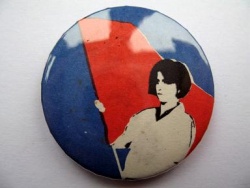
The Revolutionary Communist Party (RCP) was the forerunner of the libertarian LM network. Led by University of Kent sociologist Frank Furedi, it was created in 1977 after a sizeable minority were expelled from the Revolutionary Communist Group in 1976 and formed a grouping called the Revolutionary Communist Tendency. The RCG itself was formed after a split from the International Socialists (the forerunner of the Socialist Workers' Party). The RCT was renamed the RCP in 1981 and disbanded in 1996. Its activities were continued through its main publication Living Marxism, which in early 1997 changed its name to LM. When it was shut down by a libel action in 2000 many of those associated with the RCP/LM created a range of new organisations centred around Spiked and the Institute of Ideas, which form a continuing network described here as the LM network. Though the class politics have gone, much of the position taking, tone and tactics of the deeply sectarian RCP remain.
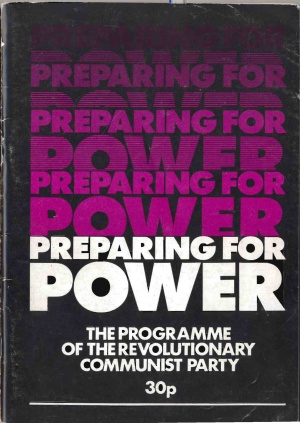
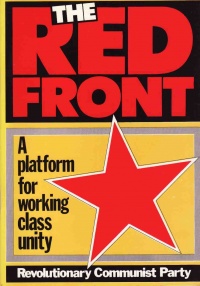
Activities


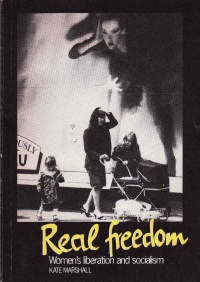

1977-1981 - Revolutionary Communist Tendency
See main article Revolutionary Communist Tendency The RCT changed its name to the Revolutionary Communist Party in 1981. Before this it had mainly been active in relation to the conflict in Ireland, racism and state violence and in attacking the Labour Party.
1980 Workers Against Racism
See main article Workers Against Racism
1982-1994 Irish Freedom Movement
See main article Irish Freedom Movement
1983 - Preparing for Power
Preparing for Power was the RCP manifesto produced for the 1983 election and subsequently reprinted over the following months.
1986-1989 - Confrontation - the 'theoretical journal'
See main article: Confrontation The RCP only started publishing a 'theoretical journal' in 1986 some five years after it changed its name from the Revolutionary Communist Tendency. The journal was short-lived apparently only continuing until 1989, by which time Living Marxism had started publication and seems to have absorbed much of the effort of the Party.
1987 - The Red Front
See main article The Red Front
1988 - Living Marxism
See main article Living Marxism
1992 - Campaign Against Militarism
See main article Campaign Against Militarism
1996 - Dissolution
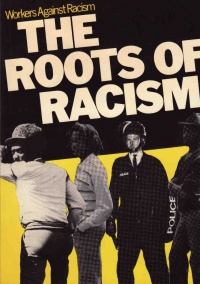
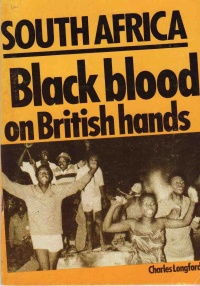
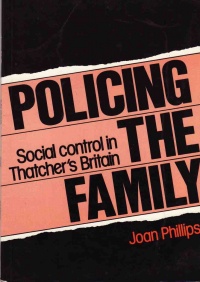
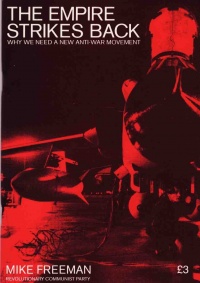

The RCP was dissolved in 1996, though this seems not to have been announced at the time. In an email written in December 1997 leading RCP member James Heartfield gave the following account of the demise of the party:
- The RCP was disbanded over a fairly long period. The last time we stood in an election was 1992. The last public campaign we were involved in was the Campaign Against Militarism (which again was set up in 1992, but carried on until around 1995). The RCP sold LM to Helene Guldberg at the end of 1996.
- Since the end of the Cold War, we were involved in discussions about the appropriateness of a democratic centralist organisation in today's conditions. The decision to wind down the party is not a ruse or subterfuge, it is the practical outcome of those discussions. If you follow the articles in LM, such as the one you posted on Pen-L, you can see the debate we had, re-presented for public consumption. I'm sure I have already argued on these lists that the Leninist style of organisation just is not appropriate when there is no substantial struggle for working class leadership.
- I'm involved in LM, as you know, which seems to me the best way to promote critical and progressive ideas today.[3]
Resources and Publications
Publications
Almost all RCP publications were published with the party publishing company set up in late 1977, Junius Publications. The 'Theoretical journal' of the RCT seems not to have continued and it was not until Summer 1986 that the RCP began producing the short lived Confrontation, described as the Party 'theoretical journal'. In addition to a range of pamphlets the principal publications of the RCP were The next step, its monthly 'review' (later a weekly paper) and later (from November 1988) Living Marxism (later renamed LM magazine). The RCP also produced numerous leaflets, posters, newsletters and other materials for its front groups and election literature.
Revolutionary Communist Pamphlets
This series began with the creation of the Revolutionary Communist Tendency and continued for a short while under the RCP banner. Soon, however, the pamphlets continued without any labelling as part of a series.
1982
- Frank Richards, Poland's black December / [Revolutionary Communist Party]. Revolutionary Communist Party (Great Britain) London (BCM, JPLTD, WC1N 3XX) : Junius, January 1982. 27 p. : ill. ; 22cm. Revolutionary Communist pamphlets ; no.12
- Mike Freeman, Malvinas Are Argentina's (Revolutionary Communist pamphlets No. 13) [Paperback] Revolutionary Communist Party (Author) Paperback: 32 pages Junius (1982)
RCP pamphlets
1982
- Kate Marshall, Real freedom: Women's liberation and socialism, London: Junius Publications, 1982, 139 pages. ISBN 0-9508404-0-8
1983
- Preparing for Power: The Programme of the Revolutionary Communist Party, London: Junius Publications, first published July 1983, Second ed. November 1983, Third ed, August 1984. ISBN 0 9508404 2 4
1984
- Mike Freeman, A Handbook for trade unionists: Taking Control, London: Junius Publications, July 1984 275 pages, ISBN 0-950 8404-5-9
- Frank Richards The miners' next step, London: Junius Publications, July 1984, ISBN 0-950 8404-6-7
- Mick Hume, After the Brighton bomb. London : Junius (Revolutionary Communist Party), 1984. ISBN 0950840475, 19p ; 30 cm
1985
- Workers Against Racism, The Roots of Racism, London: Junius Publications, January 1985. ISBN 0-950 8404-8-3
- Mike Freeman, The miners' fight for jobs: Our day will come, London: Junius Publications, March 1985, ISBN 0-9508 404-9-1
- Charles Longford, Black Blood on British Hands, London, Junius, September 1985.
- Kate Marshall, Moral Panics and Victorian Values, 1985, 2nd ed., 1986, Junius Publications.
1986
1987
- Revolutionary Communist Party, The Red Front: A platform for working class unity, London: Junius, February 1987: 7
- Michael Fitzpatrick and Don Milligan, The Truth about the Aids Panic, London: Junius Publications, March 1987, ISBN 0 948392 07 X
1988
- Mick Hume and Derek Owen, Is there a Scottish solution?: The working class and the Assembly debate [Paperback], 127 pages, London: Junius (1988) ISBN-10: 0948392096 ISBN-13: 978-0948392092
- Joan Phillips, Policing the Family: Social control in Thatcher's Britain, London: Junius Publications, March 1988.
- Keith Tompson, Under Siege: Racism and Violence in Britain Today., with a foreword from John Pilger, Penguin, 1988
1993
- Mike Freeman, The Empire Strikes Back: Why we need a new Anti-War Movement, London, Junius, April 1993.
1996
- The Point is to Change It: A Manifesto for a World Fit for People, London: Junius (1996), x-xiii.
Books
- Frank Furedi, The Soviet Union Demystified: A Materialist Analysis, Junius Publications, 1986.
- Keith Tompson, Under Siege: Racism and Violence in Britain Today., with a foreword from John Pilger, Penguin, 1988
Resources
For a full list of reading and resources see LM network: Resources
Notes
- ↑ Image taken from Noise Heat Power,Pinning down the past - part two, accessed 21 October 2010
- ↑ 'Welcome to the new-look LM', LM, February 1997, retrieved from the Internet Archive of 18 February 1998, accessed 27 October 2010
- ↑ James Heartfield M-TH: RCP from list marxism-thaxis at lists.village.virginia.edu, Tue Dec 23 03:25:59 MST 1997
